Analysis
During the visit, our valve mechanism did not work very well. The cardboard flap we had inside the fan duct failed to successfully cut off air flow, which led to our project not being able to modulate air properly. In the end, we just let the flap open so that the air can flow continuously over the bottles to make sound the whole time. However, in the future, we want the flap to be functional so that it can produce different air modulation patterns in order to open the opportunity for more interaction between human and machine.
We found that children found delight in spinning the turntable. Adults were quick to understand the concept of our project and explained to children how changing the water levels would change the sound when air passes through the bottle. Some adults were interested in our setup with the fan and even tried spinning the turntable as well.
It was surprising to see how uninterested most of the children were in changing the water levels. They seemed to be more enticed with turning and watching the turntable as opposed to the sound-producing aspect of the project. However, near the end of our time at the museum, one child was interested in hearing how a bottle would sound if it was filled to the brim with water. So she filled a bottle up with water and placed it under the fan to see how it would sound. Finding that no sound was being produced, she kept pouring a little bit of water out until it finally did produce sound (see: Summary Video).
In order to highlight the sound production aspect of the project, we plan on adding a functional and more aesthetically pleasing fan duct as well as flap to modulate air. Additionally, we plan on installing lights to highlight the bottle that is currently being blown into so that it emphasizes where the sound is coming from. Our original setup did not make clear the location of the bottle producing sound and so we believe that aided in masking the sound production aspect of the project. It also did not really facilitate pouring water in and out of the bottles to change the water levels so we plan on establishing a “water station” to make that more clear and lowering the height of the turntable by either using a smaller table or making our own stand to make the project more accessible to smaller children.
Seeing that the children are more interested in the turning aspect of the turntable, we are now shifting our focus from mechanizing the turntable to controlling the air flow to modulate the air so that the physicality of turning the turntable is not removed from the experience. We want to center the project’s focus on the interaction between human and machine where the fan flap will be programmed to control air modulation patterns while the children can control which bottles are being played and how much water is in each bottle or what tones can be played.
Summary Video
Photos
Revision Plan
For modulating the air, we will be using a solenoid instead of a servo to ensure a clear cutoff and opening of air flow for sound production. We also need to revise the fan duct design to accommodate the solenoid.
The fundamental experience does not need to be modified very much. Children will still be turning the turntable for the main experience but this time, the project will be more active in changing the sound that is produced. The turntable will also be at a more accessible height and a more appropriate “water station” will be set up to make the task of changing water levels more clear.
Air modulation will be the only new capability that will be added to the initial objectives. Lights will simply be an accessory to highlight sound production.
Task List
Additional Items to be Purchased
- Clear glass bottles
- Lights
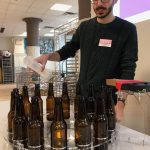
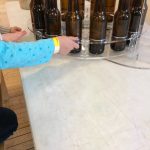
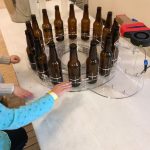
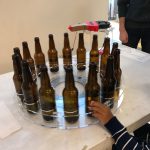
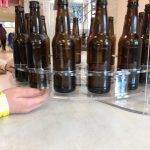
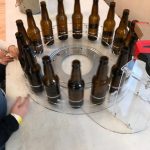
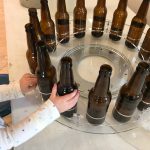
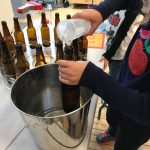
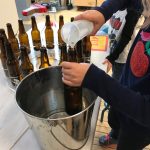
Leave a Reply
You must be logged in to post a comment.